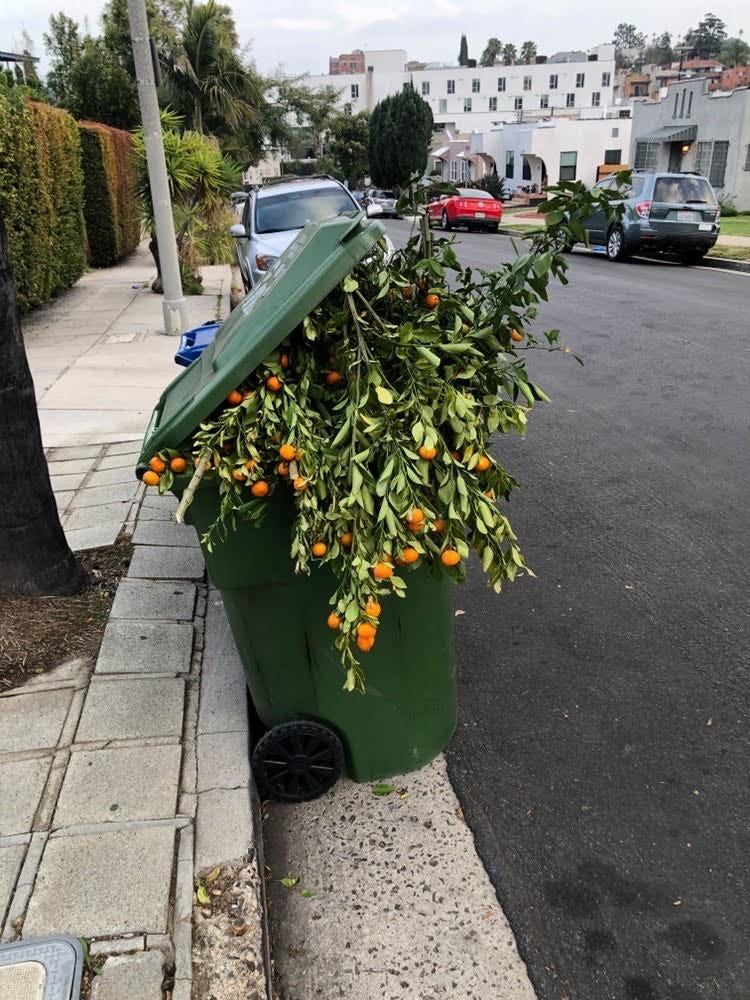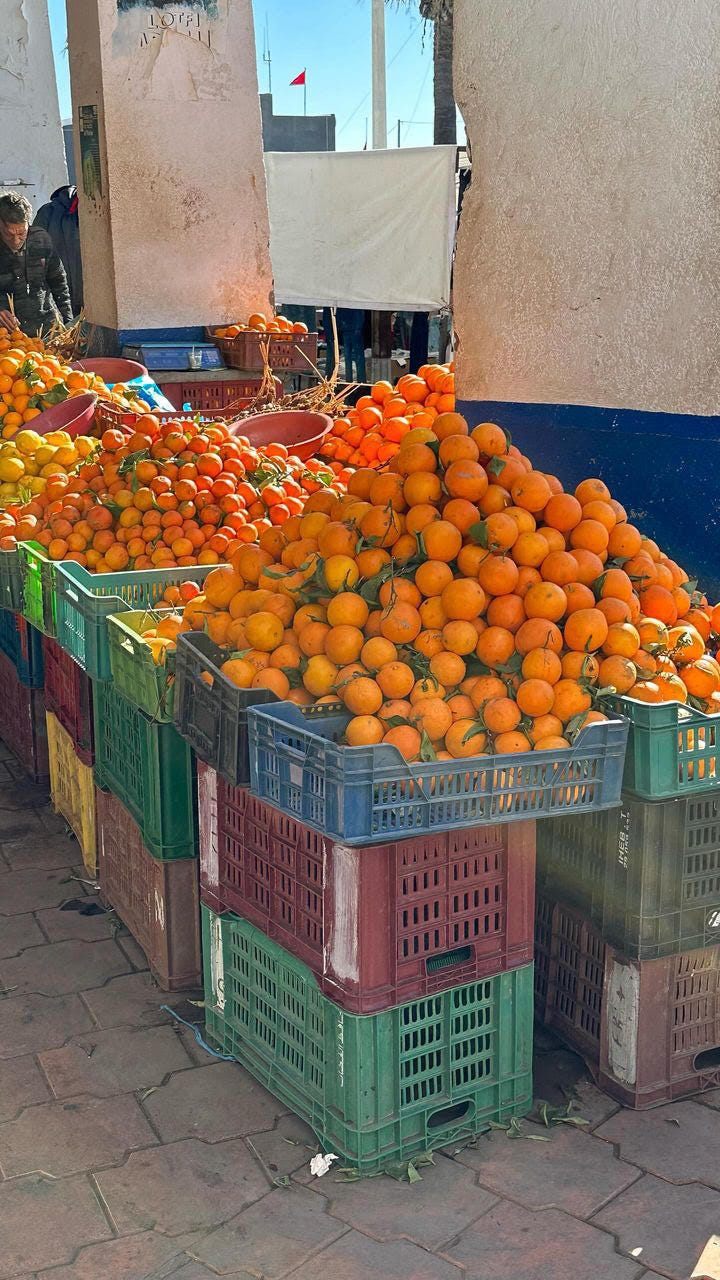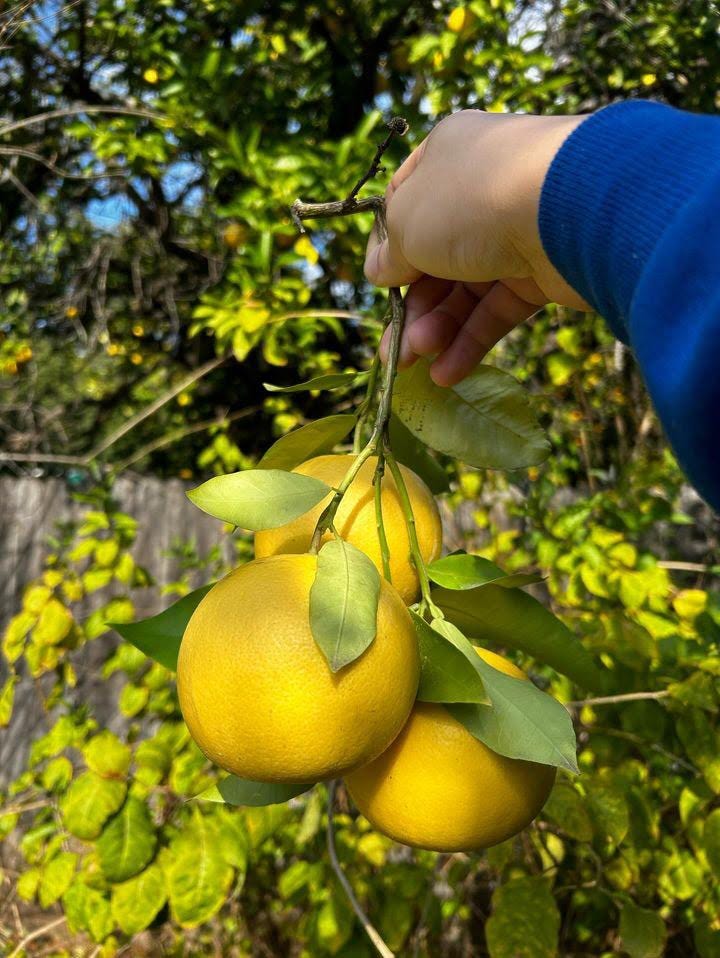It’s citrus season in Los Angeles.
Lots of people are wondering what to do with their sudden abundance of oranges, lemons, and grapefruits. There are fruit-picking parties and citrus giveaways, the more adventurous are making curds and jellies, and all the rest are throwing up their hands and asking “What to do?”
The first thing to address head on is that you can compost citrus. It doesn’t matter what you’ve heard or what “they” say. Citrus is an organic material that is eminently capable of biodegradation. However, you may want to be thoughtful in how you compost citrus, in part due to some of its more celebrated properties (oils, acid). Genuinely, though, you can do it.
Let’s walk through some of the fears and issues.
❌ “Citrus doesn’t break down.”
It does break down, it just takes time. I’ve heard “six months,” but I’ve also added citrus peels to an active, hot compost and they’ve disappeared in weeks. It really just depends on the state of your pile. If you’re hot, you can handle a lot and very quickly. If you’re on the cooler side, things will still break down—it will just take a little longer. Both options are completely fine.
❌ “Citrus is too acidic”
Adding a ton of citrus to your compost at once may impact the pH of the pile, perhaps bumping it down into the “acidic” range. However, unless you plan to keep adding buckets of orange peel indefinitely, this impact will be temporary. Your pile will sort itself out, over time, as it digests the citrus and as you resume the addition of a more diverse ingredient stream. This is particularly helpful to know if you don’t need finished compost on any particular schedule. Just add your citrus, relax, and let it work itself out.
However, if you’re an avid gardener and would like your compost to maintain a specific pH, you might be interested in keeping things more proactively balanced. In that case, just add your citrus a little more carefully. Chop the peels into small bits and, when you add them, make sure to bury them deep in the pile, where they’ll be surrounded by thriving microbes. This will ensure that decomposition can begin quickly and occur thoroughly. Simultaneously, add a corresponding amount of high-carbon material, like shredded cardboard or wood chips. Throw in crushed egg shells, too. In general, a diversity of inputs is the rule for good compost. Just add lots of other stuff each time you add citrus. This pH monitor has been recommended to me before and can help you track how things are going, if you like.
I will note that some plants, like blueberries and broccoli, prefer an acidic soil and might actually love your citrus-heavy compost. It’s worth looking up what you’ll be planting and planning accordingly. You might be pleasantly surprised!
❓ “Citrus will kill my microbes”
It has been mentioned to me that citric acid has natural anti-microbial properties, so composting citrus could negatively impact the microbial population of a compost. I have no doubt that introducing a ton of citrus at once to your pile might impact your microbes, but I am deeply skeptical this should mean “don’t compost your citrus.” Your pile can handle it. Your microbes may experience temporary suppression, but they are resilient and will rebound quickly—particularly if you continue to add more and different types of stuff to your heap. My vote is still to compost your citrus and trust the pile to do its work.
I’d also like to make two quick points: One, the citric acid in a citrus peel is of significantly lower concentration than the “citric acid” in, say, cleaning products (where it is deployed as an anti-microbial agent). Two, your citrus is likely to break down slowly. That means it will be releasing citric acid in small quantities, over an extended period of time. That seems alright to me.
✅ “Citrus will hurt my worms”
The only place I would caution you from dumping lots of citrus is a small worm bin. Worms prefer a neutral pH and the acidity in citrus, particularly high volumes of the stuff might be uncomfortable for them. If you’re dumping citrus in your regular compost pile and the worms don’t like it, they can leave. If you’re dumping it in a worm bin, though, they’re stuck. Therefore, do the worms in your worm bin a favor and offer them citrus in moderation.
❌ “Citrus has too many pesticides.”
This is from the Rodale Book of Composting, e.g. the Bible:
“The fact that some citrus peels may have spray residues on them need not be overestimated, since such residues are small and will not likely harm the soil after the material is broken down into compost.”
It seems to be the consensus amongst compost experts that pesticides on citrus do not represent an outsized risk for the overall health of your pile. In general, it helps to think of your compost as a giant immune system. It is skilled at handling pathogens and contaminants, although I am not advocating for you to deliberately add either of those things in large quantities.
Anyway, for this issue I put out an open ask to friends for photos of their citrus, and was subsequently overwhelmed with beautiful responses. I got oranges from Greece and lemons from Paris, babies eating orange slices, a cigarette pack with a lemon, and orange rinds from a farm in central California. It was magnificent. I’m still receiving pictures, even as I type and send this. I hope they never stop.
Love,
Cass






I loved that you covered citrus composting. Sometimes a confusing topic when it comes to what you can add to your compost pile.
I also loved that you included the part of about worm bins and how citrus is not good to throw in there but in compost piles with worms it is okay because worms can move away from it.
Funny you should mention eggshells. I know to add them but I kept forgetting until recently. Now when I am making eggs for breakfast I wash out the halved shells and put them open side down in the pan I am cooking in. This dries them out fast. Then I crush them down to tiny chips with my pestle and add to my worm bin to help them digest cuttings and maintain the proper pH level. In compost it adds calcium. Speaking of egg shells, sometime I would put the crushed shells around my plants to stop slugs from getting to them. I learned that the first time I found my starts eaten down to the nubs.😕
As always, The Rot is insightful, well researched and clearly explained. I love it when I see a new column pop up in my feed. I know it is always going to be good. Thanks, Cass.
Ooo thank you for this timely, thorough breakdown! I had heard some of these claims before, but I had thankfully seen somewhere (probably in your recent book actually lol) that it was fine to compost citrus, so I have been doing just that. This reaffirms that what we've been doing is more than fine, since the amount isn't enormous, I always "shred" the peels a bit as I go since I'm the one eating all the citrus, and one of our other top composted items is eggshells anyway! Your work is so appreciated!